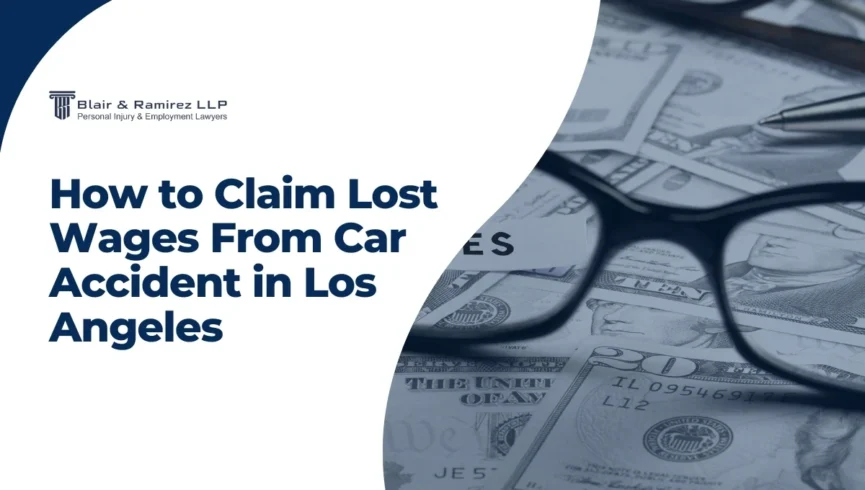If your injuries from a Los Angeles car accident kept you from working, you can claim lost wages through the at-fault driver’s insurance. This covers missed paychecks, overtime, and even bonuses you would have earned. Proof like pay stubs, tax returns, or an employer’s letter is required.
The process usually starts by filing a claim with the at-fault driver’s insurance company. You (or your lawyer) will submit evidence of your income loss along with medical records showing your injuries prevented you from working. If you’re self-employed, tax documents and invoices can help prove your losses. Because insurance companies often try to reduce or deny these claims, many accident victims work with an experienced Los Angeles car accident lawyer to calculate the full value of lost income and fight for maximum compensation.
Step-by-Step Process to Recover Lost Wages in California
Recovering lost wages after a car accident in California requires a clear process. Each step must be completed with the right documentation and timing to avoid delays or denials.
Report the Accident and Get Medical Documentation
Report the accident to the authorities and get medical proof that your injuries kept you from working. Your records must clearly indicate the connection between the injury date and the missed workdays.
Accepted medical documents include:
- Doctor’s note with work restrictions
- ER discharge summary
- Specialist treatment plan
- Disability or work status form
- Hospital admission and release records
Missing or unclear documentation can lead to the denial of your lost wages claim.
Notify Your Employer and Request Wage Records
Inform your employer immediately about the missed work due to the accident. Then gather documents to confirm your income and schedule.
Request these records:
- At least 3 recent pay stubs
- W-2s or tax filings
- Employer verification letter
- Work schedules or shift logs
For hourly or part-time roles, a consistent income history helps support your claim. Three months of records is typically the minimum.
Submit Your Lost Wages Claim to the Right Party
Once you have medical and wage documents, send your lost wages claim to the responsible insurer, your own insurance company, or your attorney.
Include these with your claim:
- Medical proof (doctor’s note, treatment plan)
- Wage records (pay stubs, W-2s, employer letter)
- Work schedule or missed shift log
- Accident report
Claims are typically reviewed within 2 to 8 weeks. Under California Insurance Code § 790.03(h), insurers must act promptly or risk penalties for delay.
Track Communications and Keep Supporting Evidence
Keep a clear record of every interaction related to your lost wages claim. Organized documentation can help resolve disputes and protect your claim in the event of problems arising.
Track and save:
- Emails with insurance adjusters or legal reps.
- Letters from your employer or doctors.
- Claim submission receipts or confirmations.
- Notes from phone calls (with dates and names).
- Updates from insurance portals or apps.
Store everything in a digital or physical folder by date to maintain a reliable paper trail.
Follow Up or Escalate if Delayed or Denied
If your claim is delayed, ignored, or denied, take action quickly to avoid further loss. Regular follow-ups demonstrate your engagement and protect your right to recover compensation.
What to do:
- Follow up weekly by phone or email.
- Resend missing or requested documents.
- Request written updates from the insurer.
- Ask for specific denial reasons in writing.
- Involve an attorney if there’s no progress.
Delays are common, but consistent follow-up can help keep your claim moving and demonstrate to the insurer that you’re documenting every step.
What Qualifies as Lost Wages After a Car Accident in California
Lost wages include any income you were scheduled to earn but couldn’t because of accident-related injuries. Valid claims cover both traditional employment and independent work, as long as the income can be documented.
Types of lost wages that qualify:
- Base salary: fixed income for full-time positions.
- Hourly wages: missed scheduled shifts or part-time hours.
- Overtime: regularly expected additional hours.
- Commissions: sales-based earnings tied to time worked.
- Gig income: Uber, Lyft, Instacart, or freelance platforms.
- Bonuses: performance-related pay if work was expected.
- Paid Time Off (PTO): vacation or sick time used during recovery.
Does not qualify:
Undocumented cash jobs, unverifiable earnings, or speculative future income cannot be included in a valid wage loss claim.

How to Prove Lost Wages Due to a Car Accident
To prove lost wages after a car accident, you need clear documentation that shows both your earnings and how the injury prevented you from working. The specific documents required will vary depending on your employment type, whether you are a W-2 employee, self-employed, or a gig worker.
Documents to Prove Lost Wages as an Employee
If you're a W-2 employee, you’ll need to provide both your income history and proof that your injuries prevented you from working. Under California Civil Code § 3281, you’re entitled to recover financial losses caused by someone else’s actions, but your claim must be backed by reliable documentation.
Accepted proof includes:
- Recent pay stubs indicate regular earnings before the accident.
- W-2 forms verifying annual income and job status.
- HR or employer letter confirming job role, pay rate, and missed dates.
- Work schedule or shift calendar to prove time lost.
- Medical documents match injury dates with missed workdays.
The medical and employment records must align to clearly show that your income loss resulted directly from the car accident.
Proving Income Loss When Self-Employed or Gig-Based
If you're self-employed or work through gig platforms, proving lost income requires a combination of tax records, business documentation, and proof of canceled work. The goal is to show a clear pattern of earnings before the accident and a disruption that directly followed due to injury.
Useful documents include:
- 1099 forms from clients or platforms.
- Previous invoices were issued before the accident.
- Schedule C tax filings from recent years.
- Profit and loss statements from accounting software.
- Client cancellation emails or messages.
- Earnings reports from platforms such as Uber, DoorDash, or Fiverr.
All documents must be supported by medical proof that confirms your inability to work during the claimed period.

How Fault Affects Your Lost Wages Claim
California follows a pure comparative negligence system, which means your compensation for lost wages is reduced by the percentage of fault assigned to you. For example, if you are 20% at fault, you can recover only 80% of your lost income.
| Your Fault (%) | Recoverable Lost Wages (%) |
|---|---|
| 0% | 100% |
| 10% | 90% |
| 20% | 80% |
| 50% | 50% |
| 75% | 25% |
| 90% | 10% |
What to Do If the Insurance Denies Lost Wages
Insurers often deny lost wage claims due to missing documents, delayed filings, or disputes over fault or injury severity. A denial doesn't mean your claim is over; there are steps you can take to respond and keep your case moving forward.
How to respond to a denied lost wages claim:
- Review the denial letter carefully: Look for the stated reason; common issues include incomplete records or a lack of medical proof.
- Correct and resubmit documentation: Fix any missing or inconsistent details in your medical or wage records and resend with proper dates.
- Write a formal demand letter: Clearly state the amount of lost wages you're claiming and include supporting documents.
- Escalate the claim: If the insurer refuses to cooperate, consider filing in small claims court if the amount qualifies.
- Consult a LA auto accident lawyer: If the denial involves legal complexity or high-value claims, an attorney can challenge the decision and handle negotiations.
Taking quick and organized action can help reverse a denial and recover the income you’ve rightfully lost.
How Long Does It Take to Receive Lost Wages?
Wage claims typically take 2 to 8 weeks to process, depending on how quickly documents are submitted and verified. Each phase of the claim has its own timeline.
Typical breakdown:
- Initial claim submission: 1-3 days.
- Insurer processing and file creation: 3-5 business days.
- Review of wage and medical records: 1-2 weeks.
- Claim approval and payment processing: 1-3 weeks.
Delays may happen if records are incomplete, dates don’t align, or the insurer requests further clarification.
Why Lost Wages Matter More Than Just Income
Lost wages after a car accident affect far more than your paycheck. When your income stops, the impact ripples through every part of your life—your ability to keep a roof over your head, pay bills on time, and support your family.
Failing to recover lost wages can lead to:
- Housing instability due to missed rent or mortgage payments.
- Credit damage from unpaid bills or loans.
- Mental stress tied to financial insecurity.
- Interrupted savings or retirement plans.
- Difficulty affording medical care or essentials.
Claiming lost wages isn’t just about money—it’s about protecting your stability, health, and future.
Can You Claim Lost Wages Without a Physical Injury?
Yes, you can claim lost wages even if your injuries are not visible. Conditions like PTSD, severe anxiety, or emotional trauma may prevent you from working just as much as physical injuries do. However, your claim must still be supported by medical evidence from a licensed healthcare provider.
Accepted evidence may include:
- Medical diagnosis from a licensed psychologist or psychiatrist.
- Work restriction letter for mental health-related leave.
- Treatment plan or therapy records.
- Disability certification based on psychological evaluation.
As long as your mental health condition directly impacts your ability to work and is properly documented, the claim is valid under California law.
When and How a Lawyer Can Help with Lost Wage Claims
Hiring a lawyer can make a major difference, especially if your claim is denied, delayed, or involves complex income records. A legal professional helps ensure your documentation is complete and your wage loss is fully calculated.
A lawyer can assist by:
- Gathering medical and wage-related evidence.
- Verifying income from multiple or variable sources.
- Calculating long-term or future wage loss.
- Communicating directly with insurance adjusters.
- Negotiating a fair settlement on your behalf.
Legal fees in Los Angeles for wage loss claims are typically handled on a contingency basis, meaning you pay only if your lawyer wins the case. Hourly billing may apply in specific situations, but most personal injury attorneys waive upfront fees.
Common Questions About Claiming Lost Wages From a Car Crash
Final Steps to Maximize Your Lost Wage Claim
To strengthen your lost wages claim and avoid delays or denials, follow a clear and organized process. Proper documentation and timely action are key to recovering the full amount you’re owed.
Checklist to protect your claim:
- Report the accident immediately and get medical proof.
- Notify your employer and request wage documents.
- Keep a detailed record of all missed work dates.
- Collect pay stubs, W-2s, or tax filings (for at least three months).
- Align medical and income dates clearly.
- Track all communication with insurers or legal reps.
- Submit your claim within the 2-year filing deadline.
- Follow up regularly if the claim is delayed.
- Consult a car accident lawyer for complex or denied claims.

Don’t wait. Blair & Ramirez LLP is here to help you take action and recover every dollar you’ve lost.
Tell Us What Happened - We’re Ready to Help

